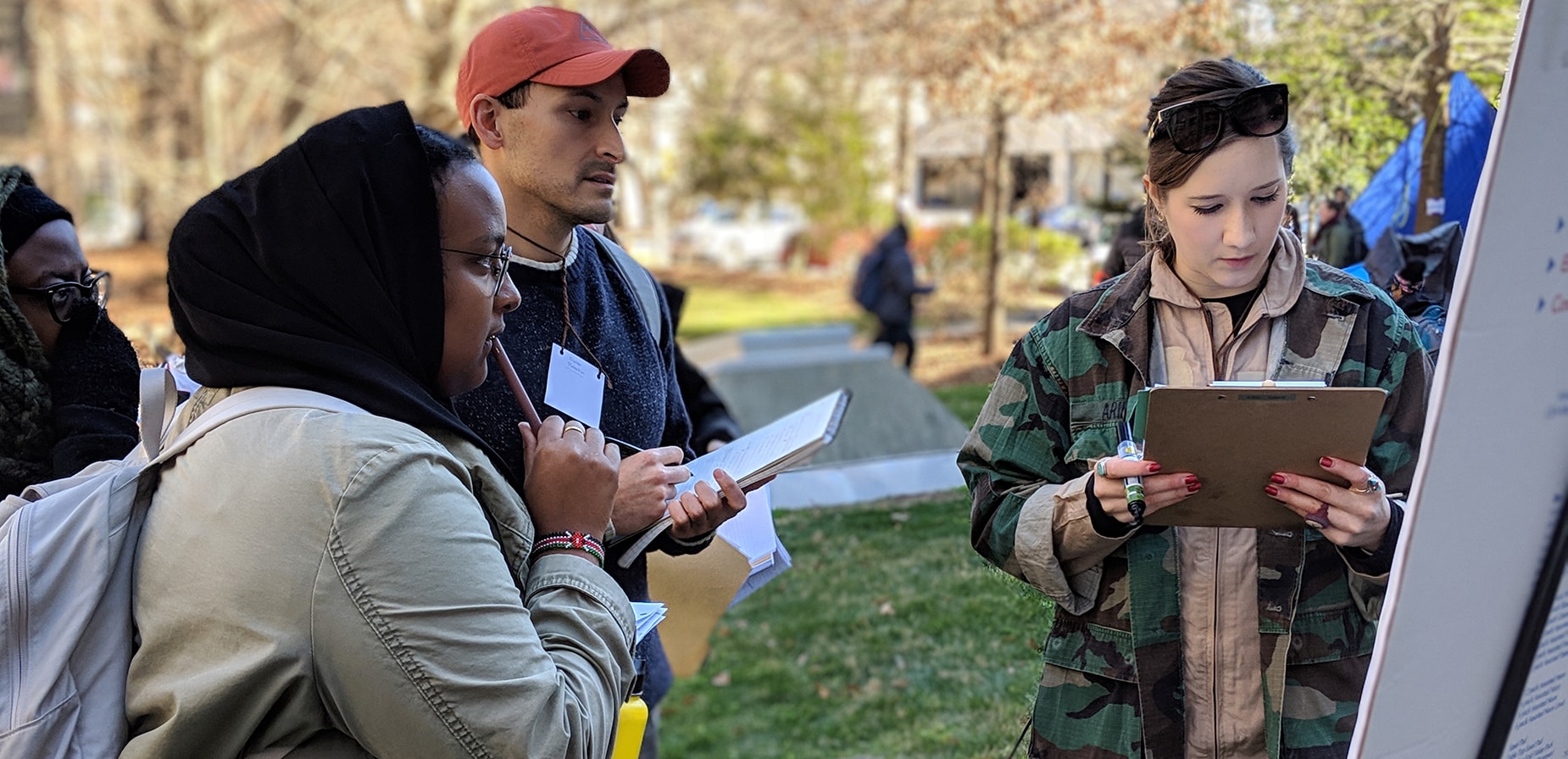Training and Education

Emergency Response and Recovery Branch staff working through the Refugee Simulation exercise with MPH students during the Health in Complex Humanitarian Emergencies course at Emory University’s Rollins School of Public Health (January, 2020). Photo: Leah Dick
The Emergency Response and Recovery Branch (ERRB) conducts varied in-person and online training activities for a breadth of topic areas such as nutrition, water sanitation and hygiene, emergency surveillance, and building rapid response capacity. Our goal is to strengthen workforce development across various fields involved in complex humanitarian emergencies. To this end, ERRB supports CDC’s internal response capacity and builds partnerships among external organizations including academic institutions, international non-governmental organizations (NGOs), United Nations (UN) organizations, and foreign governments.
Internal Support
ERRB provides technical assistance and support to expand domestic and international response capacity including training an average of 300-350 Global Rapid Response Team members each year. Due to pandemic COVID-19 response needs, the 2021-2022 cohort was expanded to 500 members. ERRB also develops and manages international emergency response operations.
External Support
Academia
ERRB has established relationships with academic institutions, where our staff teach public health emergency courses. Some staff hold academic appointments and teach courses at both domestic and international universities. Highlights of our academic initiatives and collaborations:
- Emory University – Center for Humanitarian Emergencies: Facilitate eight humanitarian emergency-related courses in the Rollins School of Public Health, Department of Global Health, and lead the Graduate Certificate program in Humanitarian Emergencies.***
- Coursera – Health in Complex Humanitarian Emergencies: Developed by the Center for Humanitarian Emergencies, a partnership between CDC’s Emergency Response and Recovery Branch and the Rollins School of Public Health, this course covers technical and management principles that are the basis of planning, implementing, and evaluating health programs for acutely displaced populations in developing countries. With an emphasis on refugees in camp situations, the course includes modules on assessment, nutrition, epidemiology of major health problems, surveillance, and program management for an international relief operation.
- University of Washington, Department of Global Health: Annual course on Health in Complex Humanitarian Emergencies led by ERRB staff both in-person and remotely from Atlanta. Similar to the Emory course taught by ERRB staff, the focus is public health and epidemiology in refugee and internally displaced populations affected by complex humanitarian emergencies and natural disasters.
- KIT Royal Tropical Institute, The Netherlands – Analyzing Disrupted Health Systems (ADHS): This 10-day residential training program for health professionals focuses on the analysis of health systems in countries affected by or recovering from protracted crisis. It is organized jointly with The Royal Tropical Institute, the Centers for Disease Control and Prevention (CDC), Save the Children, and the World Health Organization (WHO).
Other Organizations
ERRB facilitates health, epidemiology, and response operations in emergencies courses, both domestically and internationally, as an aspect of our capacity building efforts to UN and NGOs around the world. Some recent highlighted partnerships and activities include:
- UNICEF: In partnership with UNICEF, ERRB co-developed and facilitated Health in Emergencies courses in Jordan, Comoros Islands, Thailand, and Myanmar to diverse audiences including UNICEF, Ministry of Health, and NGO staff. ERRB also supported WASH response training to strengthen the use of epidemiologic data during emergencies and disease outbreaks with the Global WASH Cluster.
- Field Epidemiology Training Program (FETP) Trainings: Recently, ERRB provided technical assistance in the development of an intensive competency-based six-day course for FETP Graduates in collaboration with the World Health Organization (WHO) and Training Programs in Epidemiology and Public Health Network (TEPHINET).
- Global Disease Detection Operations Center: In partnership with the CDC Foundation and Resolve to Save Lives, CDC’s Global Disease Detection Operations Center (GDDOC) provides technical assistance to enhance regional event-based surveillance directly to four partner countries in Africa: Nigeria, Uganda, Rwanda, and the Democratic Republic of the Congo.
- Global Disease Detection Operations Center: Facilitated three event-based surveillance (EBS) training courses in Ukraine, Kazakhstan, and at CDC Headquarters for visitors from the Indonesian Ministry of Health (MoH). Each course is specifically designed and based on previously discussed surveillance needs. These training programs introduce key concepts and tools to support internet-based EBS.
- Rapid Response Team (RRT) Trainings: In collaboration with WHO, ERRB provided technical assistance in the development of an open-access, national RRT training curriculum. Additionally, CDC has collaborated with Africa CDC, WAHO, GOARN, and other partners to provide RRT trainings to more than 25 foreign governments and multiple international NGOs around the world.
***Please Contact ERCT@cdc.gov with questions regarding the Certificate Program or courses